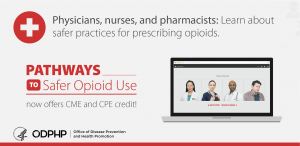Prescription-related opioid deaths continue to be a critical public health issue in the United States. To help the healthcare community address this, the Office of Disease Prevention and Health Promotion (ODPHP) developed the Pathways to Safer Opioid Use training.
The online, interactive training is designed to teach healthcare professionals and students strategies for safer use of opioids to manage chronic pain. It’s based on the recommendations for opioid use in the National Action Plan for Adverse Drug Event Prevention (ADE Action Plan). Users can role-play 4 different characters in the video-based training: a patient, nurse, pharmacist, and primary care physician. Experiencing these different perspectives helps users understand sensitive situations that may come up when treating patients taking opioids to manage pain. The training also allows users to practice applying health literacy strategies when communicating with patients.
Setting Pharmacists Up for Success
The American Pharmacists Association (APhA) saw the training as a valuable learning tool and approached ODPHP about partnering to promote it in the pharmacist community and provide free CPE credits to pharmacists who complete the training. “Pharmacists are looking to APhA for education, and this training pairs nicely with the clinical experiences that we already provide,” said Dr. Daniel Zlott, Vice President of Education Resources at APhA. “Our resources provided the nuts and bolts of safer opioid use, like basic information about the medications, how to taper people off of them, and alternatives to opioids. But Pathways goes beyond this and sets people up to be successful when dealing with real people.” Educating pharmacists on substance use disorder and opioid use was already a priority for APhA. So when the Walmart Pharmacy department approached APhA about training their pharmacists on this topic, APhA and Walmart decided to work together. Through this partnership, Walmart incorporated Pathways into the training requirements for all 18,000 of their pharmacists.
A Patient-Centered Approach
Dr. Tyler Patterson, a pharmacist and clinical services manager with Walmart, says that the response to the training has been tremendous. “Pharmacists want to make a difference in patients’ lives,” she says. “I can’t think of a day since implementing this training when I haven’t heard a success story of meaningful patient, prescriber, or pharmacist interaction.” As a clinical services manager, Dr. Patterson manages pharmacists and oversees their professional development, while continuing to see patients as part of the healthcare team. She says that incorporating the Pathways training has helped her pharmacists continue to take a more personal approach to patient care. And that causes patients to see pharmacists as a more important part of their healthcare team. “The pharmacist is the most accessible healthcare provider out there,” she says. “If we make the conversation around opioid prescriptions with our patients more personal, we can really make a difference.” Since taking the Pathways training, Walmart pharmacists have reported positive interactions with both patients and prescribers as they continue to improve their understanding of opioid use.
The Impact of Empathy
Dr. Zlott emphasizes the impact of empathetic, personal connections on addressing opioid use with patients. “A lot of us approach substance use disorder with preconceived notions — we want to treat it as a character flaw rather than a disease,” he says. “When you can get people past this notion, it changes the way they approach patients.” To date, APhA has awarded over 20,000 hours of CPE credit from the Pathways training — and almost 18,000 of them went to Walmart pharmacists. Dr. Zlott and Dr. Patterson agree that the Pathways training has been extremely helpful in preparing providers to navigate difficult conversations with patients in an empathetic and personal way. As a result of the partnership between APhA and Walmart, ODPHP measured an increase of 3000 percent in web traffic to Pathways on health.gov, which dramatically increased the reach and impact of the training with a key target audience. The success of this partnership is a valuable reminder to all of us in healthcare of what can happen when we join forces in the fight against opioid-related ADEs. Because together, we can improve patient care — and, ultimately, save lives. Interested in learning more about safer opioid use? Take the Pathways training and get free CPE or CME credit!




